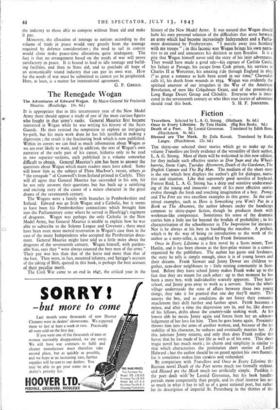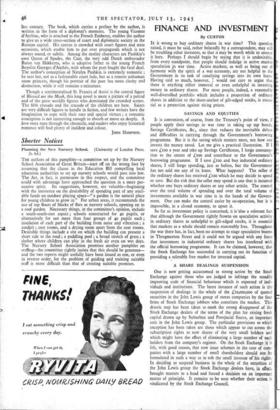Fiction .
(Hutchinson. 9s. 6c11) Blessed are The Meek. By Zofia Kossak. Translated by Kulka Langre. (Hutchinson. 12s. 6d.)
THE thirty-one selected short stories which go to make up the volume Travellers are lively evidence of the versatility of their author, L. A. G. Strong. Most of them will be welcomed in this new edition, for they include such effective stories as Don Yuan and the Wheel- barrow, Snow Caps, Tuesday Afternoon, Death of the Gardener, The English Captain and The Big Man. The medium of the short story is the one which best displays the author's gift for dialogue, narra- tive and situation. Like that supremely good novelist of boyhood, Forrest Reid, L. A. G. Strong has a deep and sensitive understand- ing of the young and innocent : many of his most effective stories evolve through the fresh and touching imagination of a boy. Prongs and The Fort are two excellent examples in this genre. In the con- trived examples, such as Here is Something you Won't Put in a Book or The Absentee, the author labours under the handicaps common to shiny-paper fiction, though he produces them with workman-like competence. Sometimes his sense of the dramatic carries him a little too far beyond the bouhds of probability ; in his characterisation of the schoolmaster in The Imposition for instance. Nor is he always at his best in handling the macabre. A preface, which is by the way of being an introduction to the work of the author as a story-teller, is supplied by Frank Swinnerton.
Once in Every Lifetime is a first novel by a Scots miner, Tom Hanlin, and it has been chosen as the first-prize winner in a contest organised by the publishers. The author has gusto and freshness, the story he tells is simple enough, since it is of young lovers and their dreams. Frank Stewart and Jenny Dewar are children to- gether, next-door neighbours in a little mining community in Scot- land. Before they leave school Jenny makes Frank wake up to the fact that they are meant for each other: up to that moment he has been a mere boy, with individuality scarcely apparent. They leave school, and Jenny goes away to work as a servant. Since the whole village understands the state of affairs between these two young things, they take it for granted that one day they'll marry. This annoys the boy, and as conditions do not foster their romantic attachment they drift further and further apart. Frank becomes a miner, and after a time the depression sets in, and he, like dozens of his fellows, drifts about the country-side seeking work. At his lowest ebb he meets Jenny again and forces from her an acknow- ledgement of her love for him. Then he goes home again. Proximity throws him into the arms of another woman, and, because of the in- stability of his character, he seduces and eventually marries her. At this juncture Jenny returns, and only then does Frank realise the havoc that he has made of her life as well as of his own. This short tragic novel has much merit ; its charm and simplicity is similar to that which characterises the proletarian short stories of Leslie Halward ; but the author should be on guard against.his own fluency, for it sometimes make& him careless and redundant.
By comparison with Travellers and Once in Every Lifetime the Russian novel Death of the Poet seems much too formally stylised, and Blessed are the Meek much too artificially simple. Pushkin i the poet 'dealt with 'by Leonid Grossman, but his book handle, periods more competently than people, and its chief interest lies no: so much in what it has to tell us of a great national poet, but rather for its description of imperial St. Petersburg in the thirties of the
last century. The book, which carries a preface by the author, is written in the form of a diplomat's memoirs. The young Vicomte d'Archiac, who is attached to the French Embassy, enables the author to give us a wide cross-section of court and diplomatic society in the Russian capital. His canvas is crowded with court figures and state occasions, which enable him to put over propaganda which is not always sound, or subtle. Among the motley characters are Pushkin's own Queen of Spades, the Czar, the very odd Dutch ambassador Baron van Hekkerns, who is adoptive father to the young French Royalist Georges d'Anthes, with whom the poet fought the fatal duel. The author's conception of Natalya Pushkin is extremely romantic ; he sees her, not as a fashionable court lady, but as a remote unhuman snow princess, though his portrait of the poet has more clarity and distinction, while it still remains a miniature.
Though a sentimentalised St. Francis of Assisi is the central figure of Blessed are the Meek, this long novel is more a picture of a period and of the great worldly figures who dominated the crowded scenes. The fifth crusade and the crusade of the children are here. Saints are very difficult figures to handle in fiction, and few writers have the imagination to cope with their rare- and special virtues ; a romantic conception is not interesting enough to absorb. or move us deeply. A love story runs through the chronicle, and readers who enjoy historical romance will find plenty of incident and colour.
JOHN HAMPSON.



























 Previous page
Previous page